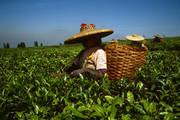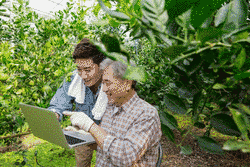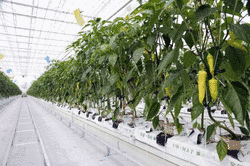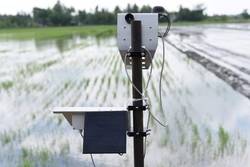Policies for Innovations in the Digital Age
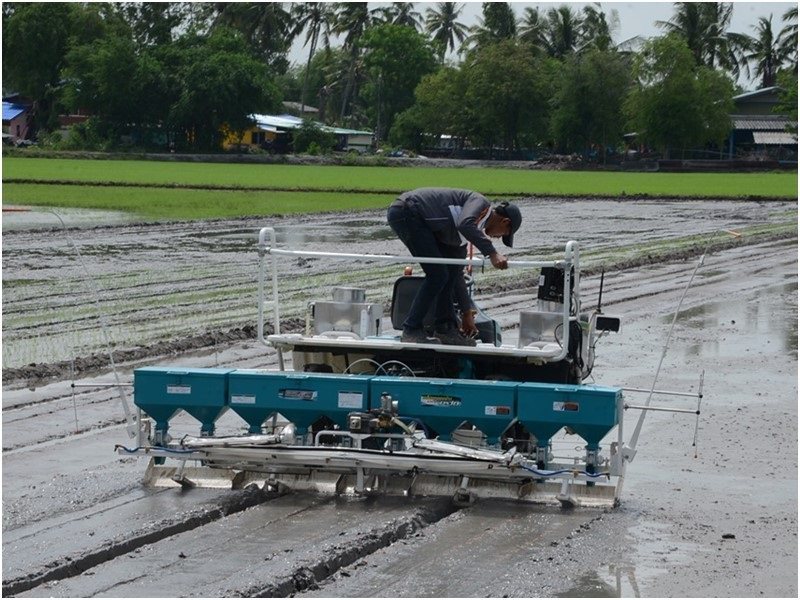
Digitalization in agriculture is transforming innovation and already provoking a shift in farming and food production. As a result, market dynamics,structure and distribution are also changing. In view of this transformation,changes to innovation policy are required in the digital age. Data handling, open science, fair access, intellectual property,and the promotion of e-literacy and digital skills in rural areas are all aspects that should be addressed to create an enabling regulatory environment for agricultural innovation.
Smart farming in Japan
Smart farming in Japan
To increase production per farmer and expand business, the government of Japan as accelerated agricultural reform by promoting smart agriculture. The heart of this programme lies in the creation of an enabling environment, including the establishment of consultation systems for farmers who may be interested in introducing such technologies.
Smart Agriculture uses technology, such as ICTS, robots and drones to automate certain tasks or work in order to increase productivity and lessen manual labor.
In Japan's demographic context, this innovation is vital. The Japanese agricultural sector has been facing serious labour shortages as the population ages. The agricultural workforce decreased from 4.14 million in 1995 to 2.1 million in 2015 and 63.5 percent of farmers (1.33 million) were older than 65 in 2015. Farmers are also finding it difficult to have successors. In addition, the average size of the smallholder farm increased from 1.6 ha in 1995 to 2.5 ha in 2015.
On the other hand, the country is struggling to meet the steadily rising demand for Japanese agricultural products abroad, and to supply its domestic market.
The issue
Japanese farmers are aging, fewer young people are choosing farming as a career while farmers have an increasing land area to cultivate. Simultaneously, demand for Japanese agricultural products is growing both domestically and for export.
Technological innovation is required in Japan to make agriculture less dependent on manual labour and to increase productivity.
The action
Smart agriculture creates an enabling environment for research and development of advanced technologies based on the needs of farmers, verification and dissemination of success stories, and environmental improvement. Ongoing examples include the use of automated tractors introduced by the Japanese company Yanmar that are helping to expand farming areas, or the scale of agriculture per farmer, within a limited cropping season; advanced water management systems through the use of smart phones; and ICT for improved precision in predicting growth phases and diseases of farm crops and consultation systems for farmers who may be interested in introducing such technologies. Farmers are encouraged to introduce advanced technologies (e.g. big data, Internet of Things, robotics, drones) to their practices, and collaborate with machinery-makers to increase agricultural productivity.
Expected results
It is expected that the automation of operations by advanced technologies will increase production per farmer and enable the scale-up of businesses. The use of ICT will enable the transfer of agricultural skills of expert farmers to young farmers. Finally, the improved precision in predicting the growth of farm crops and related diseases through the utilization and analysis of sensing data will enable the agricultural sector to become highly advanced.
Geographic focus: Japan
In partnership with the Government of Japan and Yanmar.
Smart farming in the Republic of Korea
Smart farming in the Republic of Korea
The agricultural sector in the Republic of Korea is challenged by an aging population, lack of entry of new farmers, and the expansion of the sector in neighbouring countries. To reverse the trend, the government is working to transform the country’s agricultural structure – from traditional to smart farm-oriented and technology-intensive. In 2018, the government enacted a A smart farm in Republic of Korea pivotal policy to spread smart farms in the future through the smart farm spread plan.
In the Republic of Korea, digitalization in agriculture is transforming innovation and already provoking a shift in farming and food production to smart farming. As a result, market dynamics, structure and distribution are also changing.
Smart farming is a farming management concept using modern technology – including sensors and actuators, geo-positioning systems, big data, and unmanned aerial vehicles – to increase the quantity and quality of agricultural products. Management information systems, precision agriculture, and agriculture automation and robotics are three interconnected technologies that provide the farmers with added value in the form of better decision making leading to resource efficiency and environmental sustainability.
The country is striving to create an industry ecosystem in order to expand the collection of big data through the spread of smart farms and expand the utilization of research institutions and private companies by preparing quality control measures for these data.
The issue
Growth engines in the agricultural sector in the Republic of Korea (ROK) are weakening due to an aging population, lack of entry of new farmers, and the expansion of the sector in neighbouring countries. To reverse the trend, the government is working to transform the country’s agricultural structure from traditional to smart-farm-oriented and technology- intensive.
The action
In 2018, the government enacted a pivotal policy to spread smart farms in the future through the ‘Smart Farm Spread Plan’. The Farmland Act was also revised to enable smart farms to be established and to promote financing amenable for young farmers.
Four smart farm innovation valleys were established and training provided.
Expected results
Smart farms can generate important benefits such as productivity, efficiency and quality improvement throughout the production, distribution, and consumption process of agriculture.
A study conducted by the Korean government showed that the introduction of smart farms would result in a 31 percent increase in productivity and 32 percent increase in quality while working hours would fall by 5.3 percent compared to traditional forms of agriculture.
It is expected that the value of agriculture will rise and young people will be engaged in the agricultural sector through smart farms.
Geographic focus: Republic of Korea
In partnership with the Government of the Republic of Korea
High-Tech Farming in Singapore
High-Tech Farming in Singapore
Singapore aims to be a globally-recognized forerunner in sustainable urban food solutions and food safety, with adequate supply of safe food, reaping economic benefits from the sector. The country is giving a concerted push towards the development and use of productive, climate-resilient, innovative and sustainable technologies for agriculture and aquaculture, as well as new biotech-based foods and ingredients, underpinned by a robust future-ready food safety system.
With technology and innovative tools and techniques, the agri-food sector can overcome resource constraints, raise productivity, and strengthen climate resilience. Controlled environment farming solutions will allow better control of growing variables and avoid extreme weather conditions, resulting in more stable yields and higher quality of produce.
Singapore Food Agency set a “30 by 30” goal to transform their agri-food industry and to produce 30 percent of Singapore’s nutritional needs by 2030. As part of that vision, Singapore has set up innovative agriculture solutions such as indoor, climate controlled vertical farms are right in the city centre, climate-controlled and so can produce cool-weather crops like kale, lettuce and basil, and use carbon dioxide to increase yields.
The issue
Singapore imports over 90% of its food, which makes their food supply chain vulnerable to global price fluctuations and sudden political and economic turmoil can threaten their food security. Singapore needs to produce more vegetable, fruits and protein but also be climate resilient and water and energy efficient and recycle waste.
The action
Singapore Food Agency set a “30 by 30” goal to transform their agri-food industry and to produce 30 percent of Singapore’s nutritional needs by 2030. As part of that vision, Singapore has set up innovative agriculture solutions such as indoor, climate controlled vertical farms are right in the city centre, climate-controlled and so can produce cool-weather crops like kale, lettuce and basil, and use carbon dioxide to increase yields.
Indoor fish farms use large-scale hatchery production techniques but on a smaller indoor closed-loop production system. diseases are controlled and waste is minimized.
Expected results
The indoor farms now produce 12% of Singapore's' vegetables. This has led to tenfold improvement in Asian sea bass fry survival and hundredfold intensification over the prevalent outdoor pond system. Hatchery protocols for other key marine fish species such as snapper, pompano and grouper have also been developed. Indoor hatchery production has since been adopted by our local hatcheries and nurseries.
Geographic focus: Singapore
In partnership with the Singapore Food Agency
Smart Farming in Thailand
Smart Farming in Thailand
Thailand has accumulated significant technical know-how and experience in promoting smart farming and digital agriculture. From support to start-ups and agrotech entrepreneurs, to investment and special taxation system, and smart farm education programmes, Thailand is committed to providing an enabling environment for agricultural innovation to thrive.
he issue
Despite Thailand’s impressive performance in poverty reduction, a number of challenges threaten food security such as the need to increase farmers’ resilience against climate change, inefficiencies within small-plot farming; a lack of modern technology; and limited knowledge of modern farming techniques and the importance of increasing agricultural productivity and competitiveness.
The action
Smart farming, in its essence, is simply the integration of modern ICT into agricultural management. Technological developments, agricultural robotics and biotechnology helps farmers boost their productivity while reducing the need of intensive workforce. The smart farming concept has emphasized the importance of maximizing capability among Thai farmers by adopting technology to improve rice farming capacity. Two examples are the introduction of sensory-equipped watering systems designed for seeding and paddy-sown farming; and the use of drones to increase crop production and monitor crop growth.
Expected results
A smart farm produces up to 69 percent more maize crops than a traditional farm.
The use of fertilizers and pesticides can be reduced by 50 to 70 percent from the variable cost of agricultural resources, especially with the help of unmanned aerial vehicles, like drones (which reduce labour time and costs).
Geographic focus: Thailand

